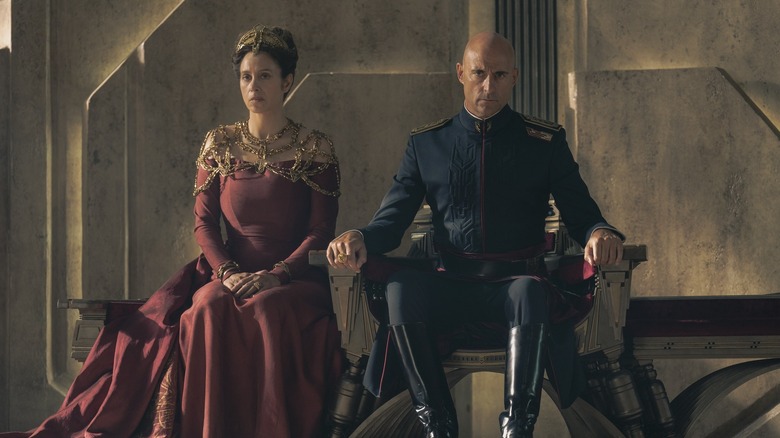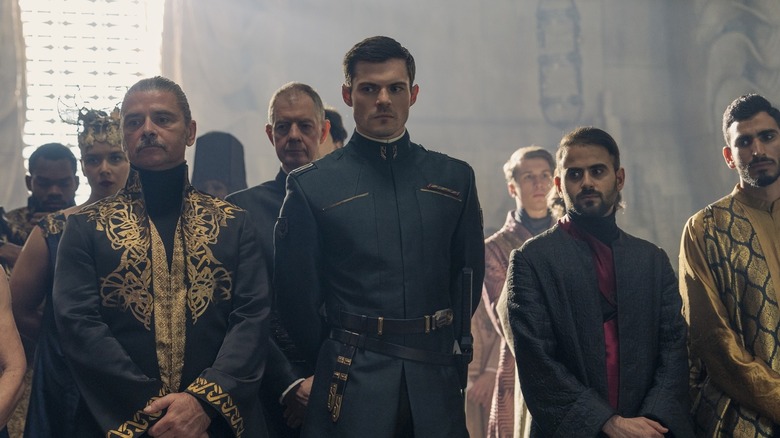Dune: Prophecy Review – Rushed Prequel Wants To Be Game Of Thrones
“The Hidden Hand,” Episode 1 in the six-episode first season of the HBO series “Dune: Prophecy,” moves at a relentless pace. Whenever a new TV show gets an oddly short season, one almost always has to ask: would it be improved by being expanded into a traditional 10-to-22 episode season, or is it one that would it be better condensed down into a long-ish movie? “Dune: Prophecy” is absolutely the former.
The first 13 minutes of the pilot deliver a nonstop barrage of exposition about the great machine wars (what the “Dune” novels called the “Butlerian Jihad”), the Harkonnen family’s disgrace, the rise of the Sisterhood (the group that became the Bene Gesserit), the ambitions of young Valya Harkonnen (Jessica Barden) within the Sisterhood, political schisms, a few deaths, and a frightening use of Voice. In a longer season, the content of this cold opening could have sustained a full episode, and having more time for character development would have made it feel less like a “previously on” catch-up.
That ultra-rushed cold opening might be responsible for the remaining 53 minutes of the pilot feeling more overstuffed than they actually are on first watch. Watching it again after sitting through the other three episodes provided for review, it doesn’t feel quite as overwhelming. It does a solid enough job introducing a bunch of characters and conflicts, even if some of the material — the scenes of training the Sisterhood in truthseeking, for instance — feels shortchanged and could easily be expanded out if given more time. And Episodes 2-4 are easier to get into, with the flashback-centric third episode, “Sisterhood Above All,” offering much a stronger emotional groundwork to the main characters’ backstories compared to the initial exposition rush. Still, the question remains: just how much can viewers really sink into all the complicated drama in just a six episode season?
An unusual sort of adaptation
“Dune: Prophecy,” developed by Diane Ademu-John and Alison Schapker, is credited as an adaptation of the 2012 novel “Sisterhood of Dune” by Brian Herbert and Kevin J. Anderson (who spoke to TheShockNews about the series’ enduring legacy). “Sisterhood” is a 10,000+ years ago prequel to the original Frank Herbert “Dune” books currently being adapted to cinemas by Denis Villeneuve, and the fourth prequel novel chronologically, so already its source material is aimed at people who are existing hardcore fans.
But perhaps the sped-up feel of this TV adaptation is due to it not exactly being an adaptation of the “Sisterhood” novel, but really more of a sequel. From what I can tell, the scenes with Valya and her sister Tula (Emma Canning) in their youth are from the book, while the sections of the show following older Valya (Emily Watson) as Mother Superior and older Tula (Olivia Williams) as Reverend Mother are original to this series. I wonder how much the strength of the third episode comes from having more pre-existing source material to draw from, as well as if the series as a whole would have played stronger if this episode’s flashbacks were done as the first episode instead.
If the “Dune” movies pitch themselves as “Thinking Man’s ‘Star Wars,'” “Dune: Prophecy” is going more for “‘Game of Thrones’ IN SPACE.” It’s a tale of court intrigue and the morally ambiguous figures manipulating power behind the scenes, this time with sand worms and thinking machines as the wild cards threatening business as usual rather than dragons and White Walkers. (Take a drink every time someone says the phrase “Great Houses” and you’ll pass out every Sunday night.) It even calls to “Game of Thrones” aesthetically — the scenes on the Harkonnens’ snow planet might as well be stationed near Winterfell or the Night’s Watch, except with fewer direwolves and more furry whales. So far, though, the “Dune: Prophecy” cast of characters isn’t as immediately compelling as Tyrion, Arya, Daenerys, et. al. — though Valya comes closest and the ensemble of actors has talent across the board.
Creepy cliffhangers keep things intriguing
For all its pacing issues, “Dune: Prophecy” knows how to keep the drama exciting enough to warrant interest; it consistently end its episodes in a way that makes one want to watch the next one. The cliffhangers deliver intense violence, surprising plot twists, and eerie horror. The show’s horror elements lean into the weirder, more supernatural elements of the “Dune” universe that the first two movies haven’t touched upon quite as much. The way the show demonstrates communing with the dead, for instance, or how it illustrates multiple characters’ collective nightmares converging in a shared place of darkness put genuine fear into the “fear is the mind-killer” mantra.
Desmond Hart (Travis Fimmel) is the most blatantly villainous character in a series defined by moral grey areas, and his signature method of murder fits right in with the lean toward horror. I’m not sure how much people will want to read into Desmond also being the most extreme hardliner against thinking machines, which show up in multiple places in the narrative despite being outlawed a century earlier. With debates over AI in the real world starting to inch toward those in the universe Frank Herbert imagined 60 years ago, it will be curious to see what if any message the next two episodes end up delivering on this topic.
Those final two episodes will go a long way toward determining if “Dune: Prophecy” is a success or a failure. Two thirds of the way into the season, it’s mostly fine — but also mostly unexceptional. It’s got enough going for it that it could build into something special, but only if it actually had time to build.
“Dune: Prophecy” premieres on HBO and Max on November 17 at 9 p.m. EST.




